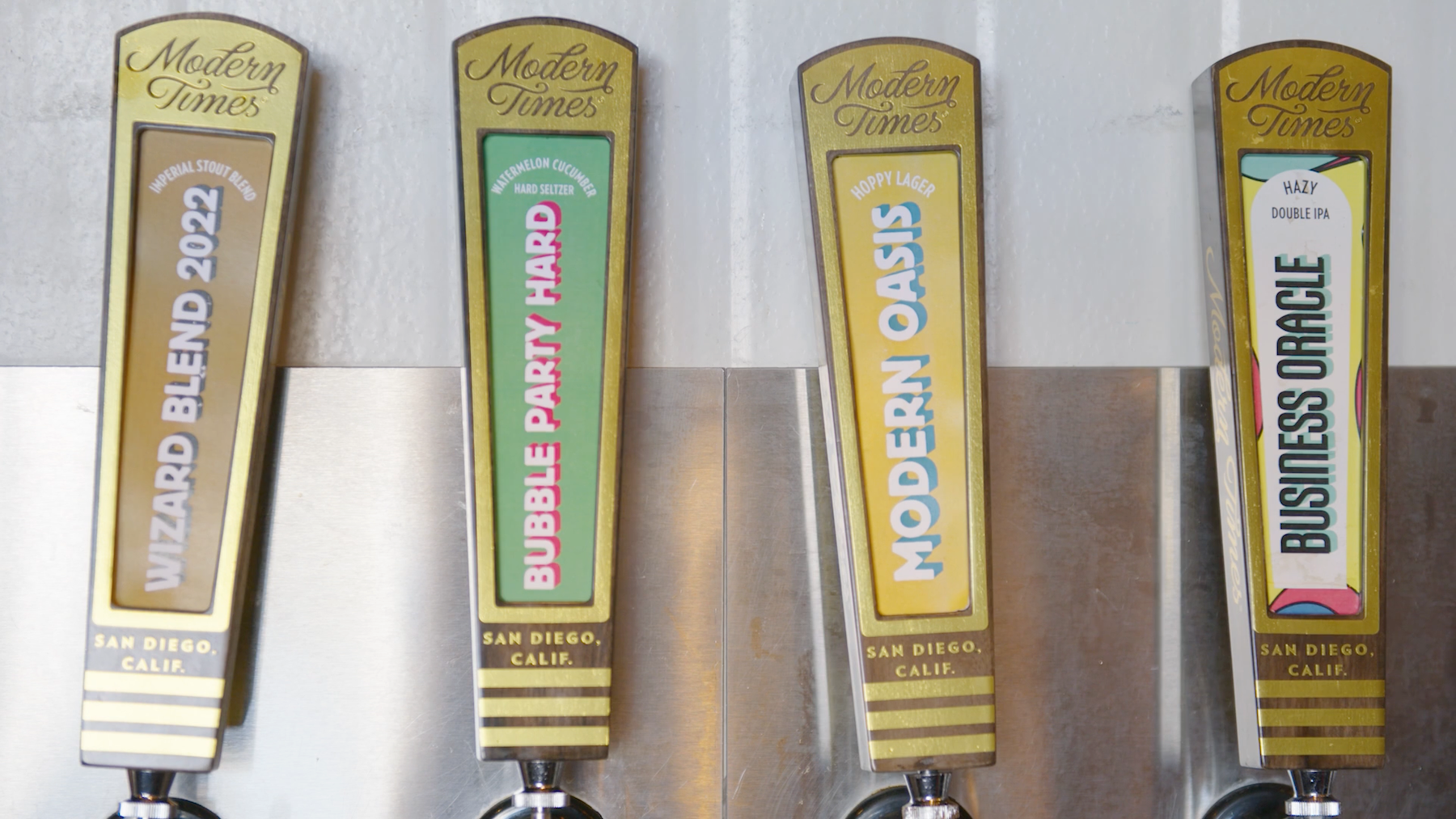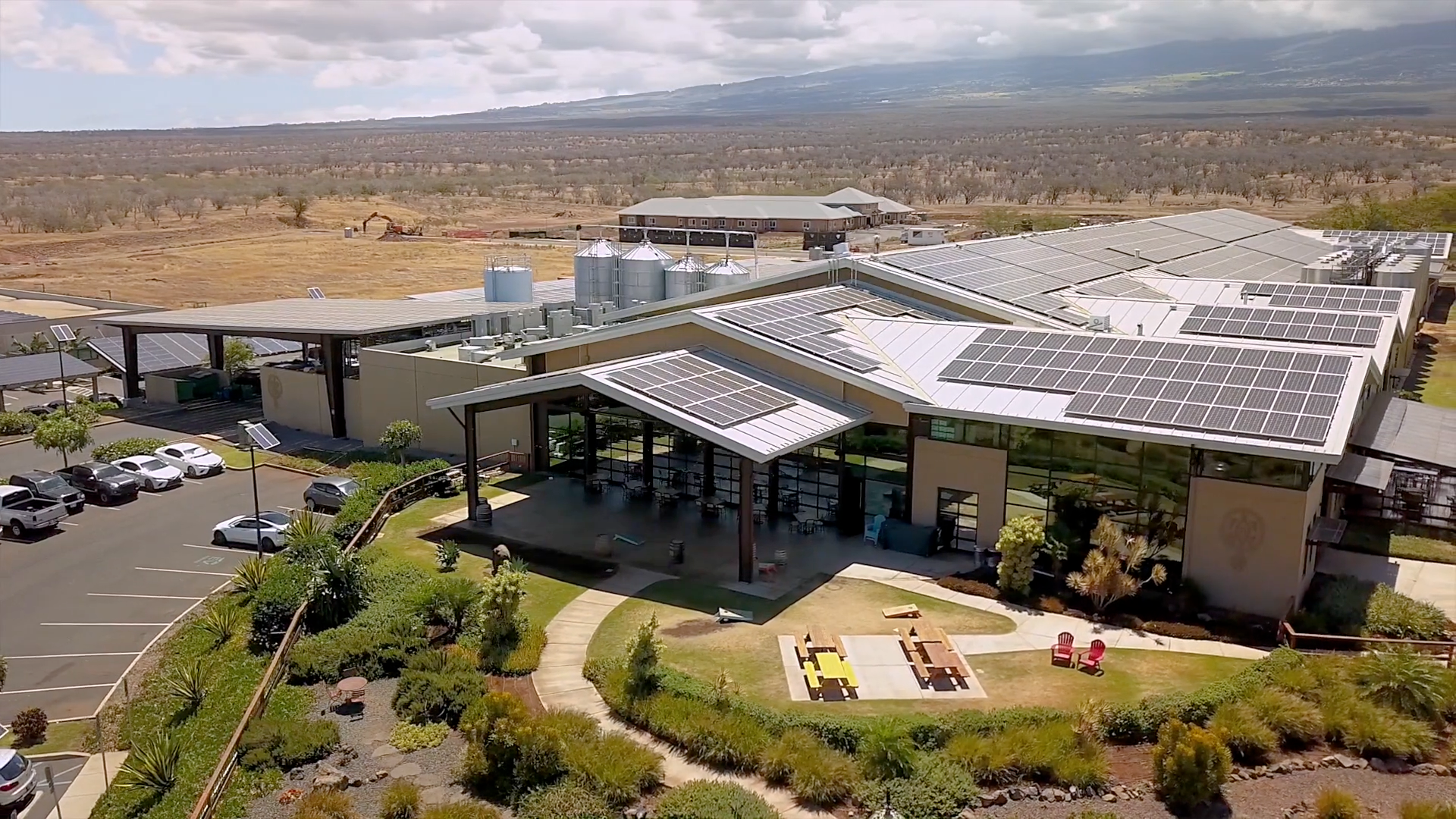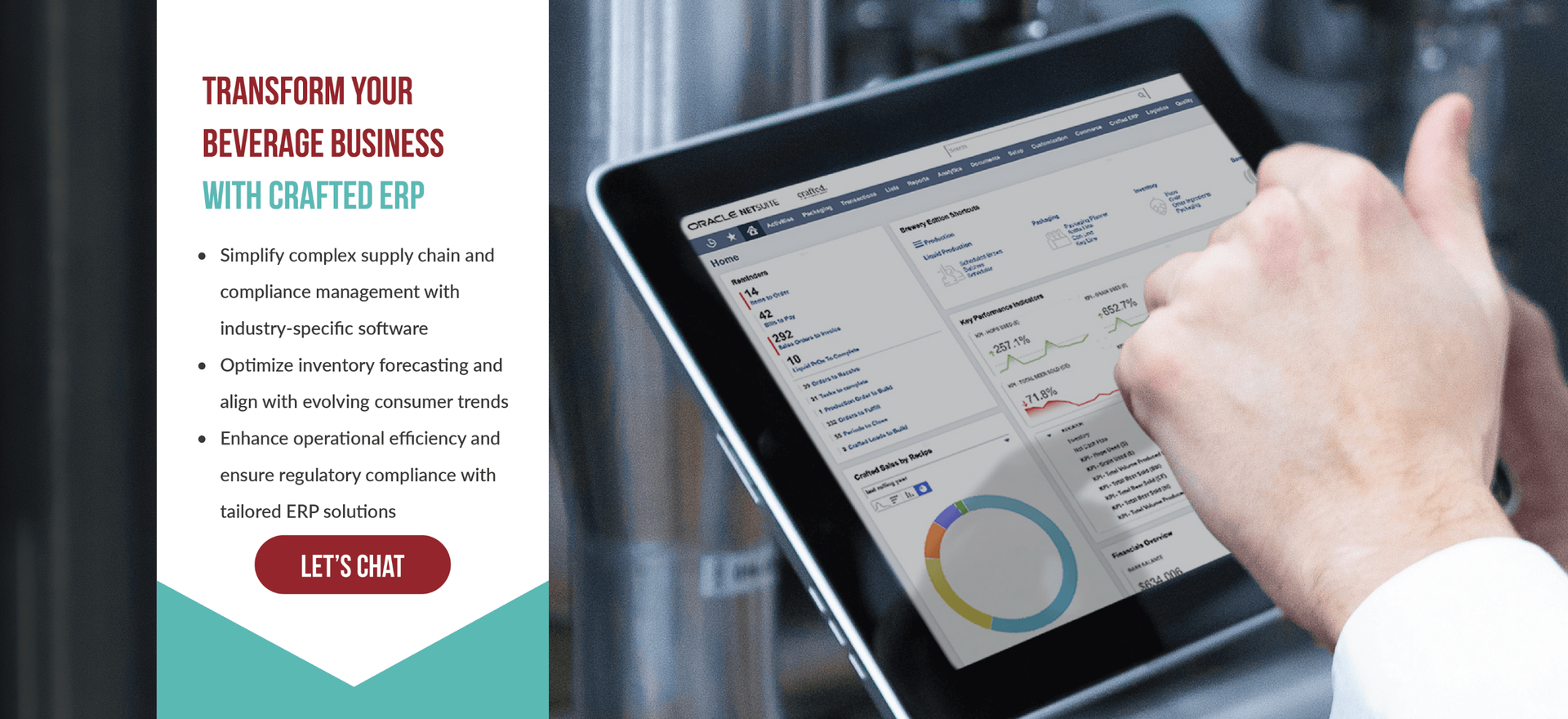The beverage alcohol industry is a complex market with unique challenges. Producers face evolving consumer habits, stringent government regulations, complex supply chains, and the need to accurately forecast inventory and demand. While there are dozens of business management systems available, most of these generic tools aren't equipped to handle the complicated regulatory requirements and level of support bev-alc producers need.
Industry-specific software built for bev-alc production leverages the knowledge and experience of this dynamic market while helping business owners streamline operations, enhance data infrastructure, improve demand planning, and drive business growth. With scalable, cloud-based options available, bev-alc businesses can configure a solution that handles both current operations and plans for the future.
Top Challenges Affecting Bev-Alc Producers
The bev-alc industry is like no other. Situated in a complex, tightly-regulated market landscape, it juggles a multifaceted set of hurdles and requirements.
Some of the key challenges producers face in their day-to-day include:
- Complex supply chain management: Unlike other consumer goods, every stage from production and packaging to distribution and sales involves multifaceted operations. Sourcing top ingredients to keep up with production demand and acquiring necessary packaging materials is key for beer, wine, spirits and RTD producers. With countless interconnected processes and stakeholders, the supply chain web can be daunting to manage without specialized software tools.
- Regulatory compliance: The bev-alc industry treads a strict landscape of compliance rules with laws spanning production, sales, distribution and beyond. Regulations can vary on the country, state, county and city level, and when modified, amplifies complexity. Keeping a finger on the ever-changing pulse of compliance laws without industry-specific tools can be a steep uphill climb.
- Inventory and demand forecasting: Inventory management and demand forecasting form another critical puzzle piece in the bev-alc industry. Balancing a fluctuating demand landscape with the need for efficient inventory management forms a constant juggling act for producers. Shifting market trends, seasonal recipe variations, natural disasters, or even economic or political crises, further compound the challenge. Accurate forecasting, in this scenario, without a sophisticated solution on hand can be a hit-or-miss, with drastic implications for business profitability.
- Consumer demands and buying habits: Nothing can be more fickle than the taste and purchase preferences of customers. Whether it’s a spike in sales due to global stay-at-home orders, a push toward healthier, more mindful lifestyle choices, or a liking to high-quality, more sophisticated brands, understanding and analyzing sales and customer insights is crucial for bev-alc business owners.
These challenges, among others, provide the backdrop for introducing industry-specific software to the bev-alc production mix.
Why Industry-specific Software is Critical to Bev-alc Production
In an evolving marketplace like bev-alc, producers need purpose-built software to manage production, compliance, financial reporting and distribution. While opting for a one-size-fits-all solution may seem like an attractive short-term fix, over time such strategies prove to deliver less value and potentially incur higher costs due to inefficiencies.
Industry-specific ERP software that is strategically developed to serve the bev-alc industry offers broad capabilities from finance and accounting, CRM, e-commerce, inventory and warehouse management, to manufacturing and order management. These features, combined with customizations tailored specifically for beverage production, provide a comprehensive suite to aid businesses in navigating unique industry challenges.
Technology to Boost Business Growth
Today, the bev-alc industry is undergoing a dynamic transformation. Producers are navigating a landscape of evolving drinking trends and customer demands while grappling with a digital disruption changing the face of business as a whole.
In the midst of this shift, technology serves as both a lifeline and a growth propellant for the industry. While effective business management solutions are available across sectors, the bev-alc industry's unique nuances necessitate software that’s customized to its distinctive needs.
Industry-specific software, such as Crafted ERP, offers a suite tailor-made for bev-alc. With its holistic approach, Crafted successfully addresses industry challenges in supply chain management, regulatory compliance, inventory forecasting and consumer buying habits.
Ways Beverage Management Software Addresses Market Challenges
Beverage ERP platforms are designed specifically to tackle what bev-alc businesses face every day. These solutions provide comprehensive financial management, centralized data and reporting, as well as business insights to inform strategic planning.
Key features of beverage ERP software that benefit bev-alc producers include:
- Financial management: Accounting teams can access up-to-date financial data from anywhere, anytime. Cloud-based beverage software ensures continuity by providing real-time reports on cash flow, sales orders, in-stock inventory and other key business areas. Out-of-the-box and customizable reports provide intelligent data insights to improve business performance.
- Compliance reporting: With various compliance reporting obligations, beverage production software has built-in features to make data organization a breeze. Businesses can configure tax management rules to view accurate and real-time GST, excise or other tax reports, and simplify the process of reporting to government entities.
- Supply and demand planning: Beverage ERP offers a wide range of tools to help supply chain managers and procurement officers have better control over ordering, receiving and supply and demand requirements. Teams can create standardized forms for purchase orders, manage vendor relationships and track supplier performance metrics. Forecasting and historical data also aids in tracking inventory levels and managing stock.
- Sales data and CRM: Bev-alc businesses can automate sales processes with live pipeline reporting and a 360-degree view of customer activity. Business leaders can gain access to real-time sales forecasts and build intelligent insights based on engagement with key targets. A centralized database of customer records helps bev-alc businesses understand buying habits and sales trends, informing strategic planning.
Beverage ERP brings a myriad of benefits to the table, helping ease regulatory pressures and drive new opportunities for growth. These key benefits, along with others such as labeling, packaging and recipe management, are uniquely designed to tackle the nuances of bev-alc production.
Bev-alc businesses have a choice to make. Do they select a run-of-the-mill software platform that adapts to virtually any industry or business type? Or, do they invest in
industry-specific tools that address the particular requirements and processes of beverage alcohol production?
Finding the Right Industry-Specific Beverage Solution
When it comes to technology to best serve bev-alc producers, tailored software solutions rise to the occasion. From managing a complex supply chain and answering stringent compliance requirements, to successfully navigating inventory and shifting customer habits, the demands of this industry are complex.
Crafted ERP has proven itself a robust solution to meet these demands. Our business management platform was developed specifically for the bev-alc industry and offers customizable features for the production of beer, wine, spirits, RTD, cider and other beverage categories. As the only true ERP on the market built for bev-alc, we meet the challenges of this fast-paced industry head-on.
Whether producing one beverage type only or managing diverse portfolios that span bev-alc, Crafted can help business owners navigate a complex marketplace.
Our customers have seen transformative results, with streamlined operations, enhanced compliance handling and improved inventory accuracy.
If you’re looking to improve productivity, compliance efficiency and profitability, a standard software platform won’t cut it. Look to a solution that’s as unique as your product.
Contact our team of bev-alc industry veterans to discuss your business needs and what you hope to accomplish in the future.
Frequently Asked Questions:
What are the key benefits of using beverage management software?
The key benefits of using software built for bev-alc production include comprehensive management of all business operations such as finance and accounting, inventory and warehouse management, customer relationship management (CRM), e-commerce, order management and demand planning. Crafted ERP’s tailored solutions handle the complexities of the bev-alc industry’s supply chain, facilitate adherence to regulatory compliance, and enable precise inventory and demand forecasting.
With cloud-based accessibility, businesses can operate seamlessly from anywhere, ensure data synchronization across departments in real time, and maintain business continuity during disruptions. Moreover, Crafted ERP provides customization for specific business needs, ongoing support and enhances ROI by streamlining operations and promoting growth.
How does industry-specific software help with regulatory compliance in the bev-alc industry?
Industry-specific software is designed to help with compliance requirements in the bev-alc industry by providing tools and features that adapt to the complex and ever-changing regulatory environment. Beverage ERP offers real-time updates on compliance regulations, automates compliance processes and ensures your business is always up-to-date on relevant laws across different regions.
This automation reduces the risk of non-compliance and saves time and resources that can be better spent on strategic planning and growth. By providing a transparent and easily auditable trail of processes and transactions, beverage management software simplifies the task of staying compliant with industry-specific regulations.
What should bev-alc producers look for when choosing an industry-specific software platform?
Bev-alc producers should look for several key qualities when choosing a software solution. First, deep industry knowledge and expertise in bev-alc ensures a software platform tailored to address the nuanced challenges and requirements of the industry. The partner should have a proven track record of successful implementations and be able to provide references or case studies demonstrating their experience.
Producers should also seek a partner that offers a comprehensive range of services, such as system customization, integration, training, ongoing support and maintenance. Software providers should be responsive and offer clear communication, ensuring a collaborative approach to implementation and the ability to adapt to the specific needs of the producer’s business.








GET IN TOUCH
1512 Larimer Street, Suite #150
Denver, CO 80202
United States
(720) 699-0200
66 Goulburn Street
Sydney, NSW, 2000
Australia
+61 2 9044 1330





